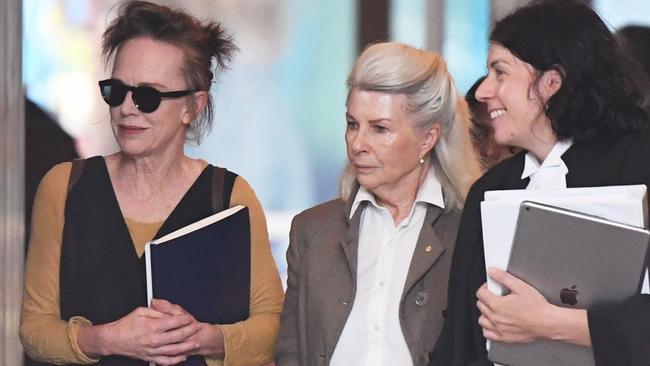Claire Harvey: Women are not cupcakes. Don’t call them ‘yummy’
The word “yummy” or “scrumptious”, used in a workplace by a man to a woman, unless she is dressed as a giant cupcake, is a red flag, writes Claire Harvey. But that seems to have escaped the judge in the Geoffrey Rush case.

Tabloid newspapers are blunt instruments.
So are courts.
It’s not easy to capture the subtlety and nuance of human interaction in a three-word headline or a cross-examination.
That, in part, has been the wonderful magic of the #metoo movement: that for the first time, our society has come to accept that sexual interactions, particularly in workplaces, are subtle and multi-layered; that people sometimes move in mysterious ways.
RELATED: Geoffrey Rush wins defamation case
A woman might agree to something that gets beyond her control, and finds herself appearing to consent to behaviour that slowly becomes something else entirely.
A man might press and push at the soft points of their target’s self-image until they get what they want. Those who engage in this kind of activity are often attractive and charming. A person might start out loving the attention, until something tips the balance, and then they feel too complicit to say anything. And the more you think about an interaction you’ve had with someone, the more you might reflect that actually it wasn’t what you wanted, and it didn’t make you feel good, and it should not have happened.

Most people have always got this at an instinctive level, but the #metoo revelations have articulated it for the first time.
That’s why it’s a hashtag. It’s the collective realisation, from men and women around the world, that something in the past was more serious, or more believable, than they’d allowed themselves to think at the time.
But having read Justice Michael Wigney’s judgment in Geoffrey Rush’s defamation case, I think all that #metoo subtlety may actually have sailed right past a large section of the community.
The case was complex. Justice Wigney has clearly considered all the evidence carefully in awarding judgment to Rush.
But, in my view, he has failed to understand that, in theory, it is possible someone can simultaneously behave in a way that is inappropriate, while also being a highly respected professional about whom nobody has ever complained.
MORE FROM CLAIRE HARVEY: What unites vile, grubby trolls? They all hate women
Justice Wigney just won’t have that. Why? Well, because a whole lot of Geoffrey Rush’s best friends came to court and said Rush is a highly esteemed Oscar-winning actor who everyone loves.
Justice Wigney said Rush had been described as, among other things, “the consummate professional” and as having been “held in very high esteem in theatre, movie and television circles. That evidence went unchallenged … it is impossible to see how that evidence could have been given if Mr Rush’s reputation for propriety with female actors was at all tarnished. An actor who behaved inappropriately towards female actors would not be ‘hugely admired and respected’,” the judge wrote.
I respectfully disagree.
MORE FROM CLAIRE HARVEY: When will fashion get what women really want?
I also think Justice Wigney has failed to grasp that sometimes the younger, less powerful person in a workplace interaction might go along with a pattern of conduct that becomes incrementally creepy.
The judge flatly refuses to believe Eryn Jean Norvill’s claim that Geoffrey Rush did things like making breast-squeezing gestures next to her body, or that he traced his fingers on her lower back.
On those questions, he says Ms Norvill’s evidence is not credible. But he also rejects the notion that Ms Norvill might have taken offence or been made uncomfortable when Geoffrey Rush used the words “yummy” and “scrumptious” to describe her.
Why? Because Norvill and Rush had engaged in a long text-message relationship in which they exchanged mildly flirtatious banter including jokey names, such as her calling him “Jet Lee Thrust” and him calling her “Erogenous Navel”.

Justice Wigney says, in effect, that therefore Norvill can’t now say she found it offensive when Rush called her “yummy” or “scrumptious”.
The judge’s reflections on this are, in my view, mind-blowingly out of touch with my experience of the workplace, or the views of the ordinary reasonable reader.
“It may be accepted that in some contexts, and in some circumstances, it may be inappropriate for a man to refer to a woman’s appearance in a workplace setting as ‘scrumptious’ or ‘yummy’. However, context is everything. I do not accept that it is invariably or necessarily inappropriate, let alone ‘scandalously inappropriate’ to use such words in a workplace setting when talking to a woman. Nor do I accept that it would necessarily constitute ‘inappropriate behaviour of a sexual nature’,” the judge wrote.
Wow. So if the judge thinks “yummy” is OK in a theatre rehearsal room, would it also be OK in a factory? What about in a hospital? A bank? A law firm?
And if you’ve got a young woman from that very theatre in your court telling you she doesn’t find the word “yummy” to be acceptable, why not believe her?
I put it to His Honour that the word “yummy” or “scrumptious”, used in a workplace by a man to a woman, unless she is dressed as a giant cupcake, is a red flag.

Ultimately, the judge just didn’t think Eryn Jean Norvill’s testimony stacked up to Geoffrey Rush’s.
“The impression I gained about Ms Norvill was that she was a witness who was prone to exaggeration and embellishment. I do not accept that she was an entirely credible witness, or that the evidence she gave about Mr Rush’s conduct was reliable,” the judge said.
The judge does not believe Eryn Jean Norvill’s claim that all the other actors, including Robyn Nevin, knew what Rush was up to, but didn’t say anything because he was, well, Geoffrey Rush.
RELATED: Actor tells Geoffrey Rush trial ‘sexual predators’ rife in theatre industry
Ms Norvill told the court: “I was at the bottom of the rung in terms of the hierarchy and Geoffrey was definitely at the top. That was in play.
“I have to be honest and say that his power was intimidating and, this person, I wanted to be a part of his world, and we were also playing father and daughter.
“I felt that if I was to speak or reprimand the behaviour I might jeopardise — I would jeopardise — that relationship, the tenderness, the closeness, the love that is needed in those two roles.
“Everyone else didn’t seem to have a problem about it, you know, so I was looking at a room that was complicit.
“There was a culture of bullying and harassment in that room, and in my industry. And it is accepted and normalised,” Ms Norvill said.
About Robyn Nevin, she added: “we’re from different generations; maybe we have different ideas about what is culturally appropriate in a workplace.”

The judge seemed staggered by this idea.
He openly dismisses any suggestion that Robyn Nevin, fellow actress Helen Buday or director Neil Armfield might have a different take on Rush’s behaviour but kept silent because they came from a different generation, one in which such things were tolerated.
“That submission is rejected. There is simply no basis for it,” the judge said.
“No such suggestion was put to Ms Nevin, Ms Buday or Mr Armfield in cross-examination. Even putting that to one side, each of them was a highly qualified, experienced, accomplished and well-respected, if not revered, figure in theatre circles. No question was raised about their character or integrity. Nor could it have been.”
RELATED: Support for actress Eryn Jean Norvill as Geoffrey Rush wins defamation case
And with that, the judge dispatches any notion that today’s young woman might have a different standard of what’s OK than, say, her mother.
At the start of his judgment, Justice Wigney repeatedly said The Daily Telegraph’s story associated Rush with the #metoo movement and therefore effectively painted him as a “pervert” on the scale of Harvey Weinstein or Kevin Spacey — and that The Telegraph totally failed to prove that he was, in fact, a pervert.
I think Justice Wigney has completely missed the point.
You don’t have to be a pervert or a predator to be capable of inappropriate behaviour that makes a young woman feel, as Eryn Jean Norvill put it, “small as a human”.
Claire Harvey is the deputy editor of The Sunday Telegraph


